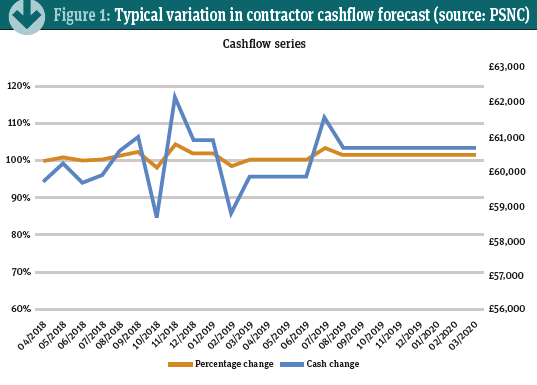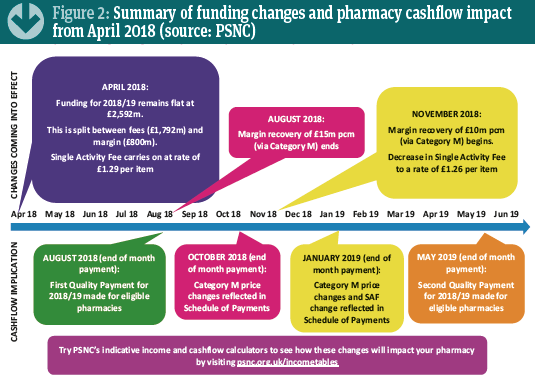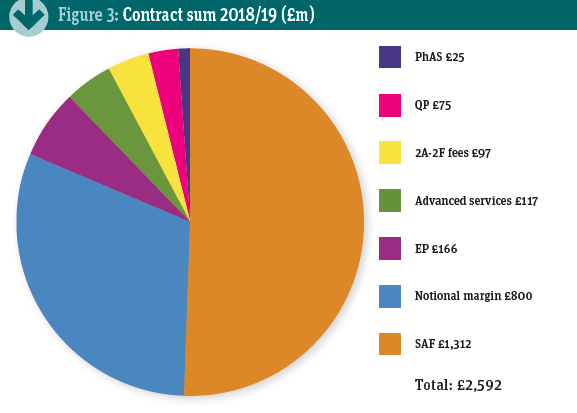Pharmacy funding: Negotiator goes goodwill hunting
In Practice
Follow this topic
Bookmark
Record learning outcomes
PSNC is hoping its goodwill in accepting a flat 2018-19 funding offer from the Government will be recognised in future negotiations. Here we look at the reaction to the deal and examine what it means for a sector desperately feeling the squeeze...

Funding settlement at a glance
• Overall funding maintained at £2.592bn for 2018/19 (£1.792bn in fees and allowances plus £800m in margin)
• Single activity fee reduced by 3p to £1.26
• £10m reduction per month to category M prices for five months from November
• Offer unanimously accepted by PSNC, “while recognising the great difficulties faced by contractors but also the need to begin rebuilding constructive working relationships with the Government after a two-year hiatus”
• PSNC continuing to push for a new services-based contract and a multi-year funding settlement
Pharmacy contractors in England should prepare for a significant cash flow dip at the end of January 2019 as a result of the funding settlement announced in October, PSNC has warned.
Category M reimbursement prices have been cut by £10m per month from November for the next five months until March 2019.
This follows the pause in margin recovery over the summer and will repay the excess margin earned by pharmacies in previous years, in particular 2015-16, where there was a significant over-delivery of margin.
The single activity fee was also reduced by 3p to £1.26. The margin recovery has been reintroduced at a lower monthly rate than previously (£15m) but its effects will begin to be felt early in the new year once contractors’ November FP34 payments have been fully reconciled.
No new money
There will be no overall increase in funding for 2018-19. The total amount will stay at £2.592bn, which PSNC says is still “an improvement” on a previously planned funding cut of £33m that was revealed in the High Court action.
Chief executive Simon Dukes said it was a “difficult decision” for PSNC to accept the offer but being able to reach a negotiated settlement for 2018/19 “moves us forward in this process and away from the adversarial position that has halted progress over the past two years”.
“We hope the Government will see this agreement as a signal of our willingness to work with them in the future and we have stressed our desire to start negotiations on 2019/20 as early as possible,” he said.
In accepting the offer, PSNC expressed to the Government its deep concerns about the financial pressures facing contractors and the fact they would increasingly be unable to reinvest, given pressures from rising staff costs and business rates.
In the context of the immense financial pressures on the NHS, and pending substantial discussions on the long-term future of community pharmacy, maintaining funding levels was felt by the negotiator to be the priority and the best likely offer.
PSNC repeated its calls for progress to be made in amending the current margin delivery system to smooth adjustments and to remove the inequity in delivery caused by the proliferation of branded generics.
PSNC’s intention is to work towards a multi-year settlement that will give more certainty for contractors about future funding.
Heavy heart
PSNC vice-chair Bharat Patel said: “[We] agreed to this funding settlement in one part with a heavy heart, because all our businesses are struggling at the moment, but in the other part with optimism. Although we are in the very early stages of rebuilding our relationship with the Government, we hope we are starting to move towards more constructive dialogue about the future of pharmacy services.
Our best strategy for success going forward will be to work with Government, he added.
Funding and contract subcommittee chair Peter Cattee was concerned about the effect category M reductions would have on cash flow and said that PSNC “only very reluctantly accepted that part of the funding package”.
“We felt that spreading the margin recovery over five months would minimise the impact on cash flow as much as possible,” Cattee said, adding that PSNC was only prepared to agree to a £50m clawback, “pending agreement on the final results of the latest margin surveys”.
He pointed out that the “retained margin system no longer works in the way that we want it to” and that PSNC is exploring alternative funding models “in great detail”.
PSNC director of pharmacy funding Mike Dent described the flat funding settlement as the “most optimistic scenario” contractors could have expected. “The minister could have cut funding [but] chose not to,” he said.
PSNC is keen to explore ideas with ministers about the development of pharmacies’ role in line with the emerging NHS long-term plan.
Alice in Wonderland
Contractors expressed dismay that their margins will be squeezed between November and March by the £50m category M clawback and a 3p drop in the single activity fee.
Martin Bennett, superintendent pharmacist at Associated Chemists (Wicker) Ltd in Sheffield, says the news was unexpected. “I thought, given the amount of goodwill that has been spouted, that the Department would have decided to put margin recovery on hold until talks reach the stage of deciding a new kind of contract,” he told PM.
It will take time to move towards a service-based contract, he thinks, and adding more financial pressures at this stage will make the transition more difficult.
Bennett estimates that the combination of the 3p per item fee reduction and category M clawback would result in a monthly reduction of £3,300, or £16,500 over the five-month period for his business.
This comes on top of efficiencies his pharmacy has already had to make, he says, chiefly staff hours. “There’s not much else you can cut. Most of your other overheads you are committed to – the lease on your building and so on.
“These cuts and repayments will have far more impact on independents than the multiples,” he argues. “We made investment decisions in the past based on the previous year’s profitability, only now to be told that we had been ‘overpaid’ and so that profit should probably have been a loss. If we had known that at the time we would have made different decisions.”
He thinks PSNC should not have accepted the offer. “PSNC should have explained that it wanted a fresh start with the Department but could not condone a settlement that would inevitably reduce both quality and service to patients. The DHSC would then have had to impose the settlement, which in the long run would be better than us accepting it.”
The settlement being implemented with just nine days’ notice was “totally unacceptable”, he said. “How can we plan ahead financially?”
Bennett believes the retained margin system is no longer fit for purpose. “To an outsider it must seem strange; even to an insider, it doesn’t make much sense.
“We think we’re on a clean slate at the beginning of the year, only to find six months in that it has been calculated we were overpaid in the previous year.
“What happens to someone who’s just bought a pharmacy? Are they liable for the overpayments from two years ago? That can’t be right. Alice in Wonderland has nothing on the pharmacy contract.”
Political rhetoric
Graham Phillips, superintendent pharmacist at the Manor Pharmacy Group in Hertfordshire, does see some grounds for cautious optimism.
Matt Hancock has spoken “quite favourably” about community pharmacy during his tenure so far as health secretary, he says, and working relationships among the sector’s representative bodies are more cohesive than in the recent past.
The question is whether Mr Hancock’s gestures signify “a genuine change of heart by the NHS or just political rhetoric.
Phillips also wonders whether pharmacy in England is going to be working to “the Scotland model or the Amazon model” in the future. But there is no getting away from the fact that the announcement makes things harder for contractors in England.
He believes cuts-related stress is affecting pharmacists’ mental health and that the sector is “close to going critical”.
“What I’ve always argued is that, rather than margin recovery, the Government should put the money into stabilising the system and give us breathing space – but it is not doing that. The system will continue to be destabilised and it is unsafe for patients and practitioners.”
Like Martin Bennett, Graham Phillips has already had to cut staff hours, which he “hates” because it puts supervising pharmacists under “increasing pressure”. He expects to have to cut back even further over the next few months. “I have no choice – I’ve got the bank at my back.”
Reaction from the pharmacy bodies
The NPA recognised that the decision to accept the DHSC offer was motivated by “a desire to develop constructive relationships with Government,” which it described as a sensible approach.
The most immediate concern was the category M clawback and its impact on cash flow.
“Hard working independent pharmacies deserve to feel that better times are ahead,” said the NPA. “What is needed is clarity from Government about its ambitions for the sector and an assurance that productivity, quality and patient-centred results will be properly rewarded.
“In turn, pharmacies must continue to deliver the very best service possible in difficult circumstances. Only by continuing to demonstrate value can we hope for the kind of settlement we want for the medium and long term.”
RPS English Pharmacy Board chair Sandra Gidley said that given inflation and rising workload, the settlement is still effectively a cut. “It will do little to relieve the pressure on pharmacies and the teams they employ. However, I’m pleased that negotiation conversations have now started between PSNC and NHS England.
“We are now facing into the challenges of the NHS Long-Term Plan and look forward to seeing developments move towards a contract based on services for next year’s settlement.”
Steve Anderson, managing director of Phoenix UK, said PSNC had actually done well to avoid a further catastrophic cut to funding. “However, this reinforces the need to agree quickly a service-based contract that provides fair and sustainable funding to unlock the full potential of community pharmacy.
“This crucial contract needs to provide the healthcare services our local communities badly need and, at the same time, alleviate pressure on other parts of the NHS.
“The health secretary, Matt Hancock, has talked in very positive terms about the potential of community pharmacy. Let’s make that a reality through constructive and positive dialogue.”

 There will be no overall increase in funding for 2018-19. The total amount will stay at £2.592bn, which PSNC says is still “an improvement” on a previously planned funding cut of £33m that was revealed in the High Court action.
There will be no overall increase in funding for 2018-19. The total amount will stay at £2.592bn, which PSNC says is still “an improvement” on a previously planned funding cut of £33m that was revealed in the High Court action. PSNC vice-chair Bharat Patel said: “[We] agreed to this funding settlement in one part with a heavy heart, because all our businesses are struggling at the moment, but in the other part with optimism. Although we are in the very early stages of rebuilding our relationship with the Government, we hope we are starting to move towards more constructive dialogue about the future of pharmacy services.
PSNC vice-chair Bharat Patel said: “[We] agreed to this funding settlement in one part with a heavy heart, because all our businesses are struggling at the moment, but in the other part with optimism. Although we are in the very early stages of rebuilding our relationship with the Government, we hope we are starting to move towards more constructive dialogue about the future of pharmacy services. Contractors expressed dismay that their margins will be squeezed between November and March by the £50m category M clawback and a 3p drop in the single activity fee.
Contractors expressed dismay that their margins will be squeezed between November and March by the £50m category M clawback and a 3p drop in the single activity fee. Bennett believes the retained margin system is no longer fit for purpose. “To an outsider it must seem strange; even to an insider, it doesn’t make much sense.
Bennett believes the retained margin system is no longer fit for purpose. “To an outsider it must seem strange; even to an insider, it doesn’t make much sense.